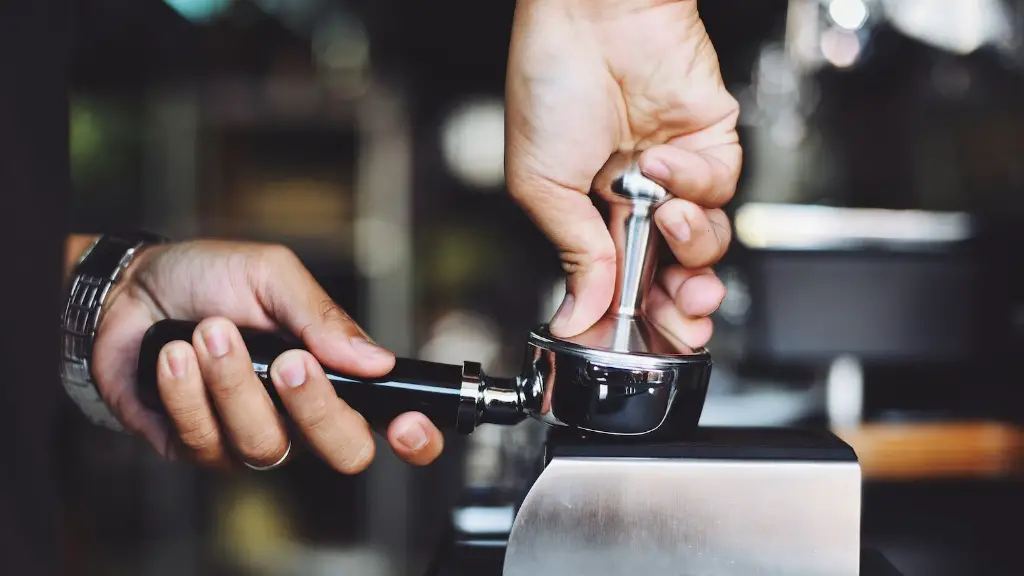In recent years, coffee has become an increasingly popular beverage, gaining a particularly strong hold among millennials. With its energizing properties, many young people have become avid consumers of coffee at an early age. While there is some ambiguity surrounding the recommended age to start drinking coffee, understanding its ingredients and effects can help anyone decide when to introduce it into their lifestyle.
Coffee is made from roasted and ground beans of the coffee plant. It has beneficial properties through a stimulant drug in the beans called caffeine, which acts as a stimulant on the central nervous system. It increases alertness, boosts energy levels and reduces fatigue. In addition to this, coffee also contains trace amounts of beneficial micronutrients like antioxidants, minerals, and vitamins. For example, one cup of coffee contains about 11% of the daily recommended value of Riboflavin and 6% of Niacin.
The general consensus among experts is that coffee is safe for adults to drinkevery day. The FDA recommends a maximum of 400 milligrams for adults which is about 4-5 cups of coffee or caffeinated beverages. As with any stimulating substance, drinking coffee is not suitable for children and adolescents, as their bodies are not yet capable of processing it. The American Academy of Pediatrics (AAP) recommends that children consume no more than 100 milligrams of caffeine and that adolescents limit their intake to no more than 2 cups of coffee daily.
It is important to note that drinking too much coffee can have negative side effects. Caffeine overdose can cause nausea, anxiety, irregular heart rate, and even insomnia. Coffee is also acidic and can aggravate digestive problems in individuals with ulcers or acid reflux. In this case, it’s best to stay away from coffee or limit the intake.
There is no definitive answer as to when people should start drinking coffee. The decision should be based on an individual’s age, health and lifestyle. For example, it might be better for to young adults with physically demanding lifestyles and sports activities to drink coffee for the energy boost, while for younger children or adolescents, it might be better to instead introduce hot chocolate or herbal teas.
What about decaffeinated coffee?
Decaffeinated coffee, or “decaf” as it is commonly referred to, lacks the potentially energizing stimulating effects of regular coffee. One 8-ounce cup of decaf has around 3-12 milligrams of caffeine, whereas 8 ounces of regular coffee usually contains 95-200 milligrams. Decaffeinated coffee is also often consumed by those who are sensitive to caffeine or have difficulty sleeping due to its low caffeine content. In this case, age is not a determining factor as decaf can be drank safely by people of all ages.
Decaffeinated coffee still shares the same ingredients as regular coffee and has similar health benefits. This includes the beneficial micronutrients and the antioxidants. However, since the decaffeination process requires the coffee beans to be treated, some of the beneficial micronutrients can be lost in the process.
Decaffeinated coffee can be a suitable alternative for those looking to get the same flavor and benefit as regular coffee without the stimulating effects of caffeine. For young children or sensitive individuals, it could be a good option.
The benefits of Drinking Coffee
Apart from providing energy and alertness that help improve physical performance, coffee also carries a range of health benefits. These include reducing the risk of cardiovascular diseases, improving insulin sensitivity, and reducing the risk of Alzheimer’s, Parkinson’s, and other ailments. Studies have also shown that drinking coffee might reduce the risk of some types of cancer, diabetes, and stroke as well.
Most of these studies have been conducted on adults and drinking coffee in moderation. Other studies have also shown that this benefit might be further enhanced when consumed in the form of organic coffee. This means that apart from people of all ages, those looking to take advantage of these benefits can also benefit from choosing organic coffee.
Coffee has also been used for centuries for its aroma, flavor, and energizing properties. In many cultures, it is seen as a symbol of socializing and connection. Coffee is thus enjoyed by millions of people around the world of all ages, including children and adolescents from non-coffee drinking countries.
Can drinking coffee be an addiction?
While drinking coffee can be very beneficial, it is also important to note that it can be addictive. Caffeine is found in a variety of beverages and food items, thus it can be easy to become dependent on it. People can begin to experience withdrawal symptoms like severe headaches, irritability, nausea, and fatigue due to excessive intake.
It is thus important to limit the intake of coffee, especially when introducing it to young people and children. It is also important to ensure that the intake is balanced with other non-caffeinated beverages and foods.
It is also important to note that people can become addicted to the taste and flavor of coffee, rather than the caffeine. Thus, focusing on the flavor of the coffee and learning how to properly brew it can make it just as enjoyable without the need for the stimulating effect.
Coffee Alternatives
If coffee is not suitable for someone, there are still options available to gain a boost of energy. Non-caffeinated beverages like green tea, herbal teas, and other nutrient rich beverages are great options to get the same benefits of coffee without the caffeine content.
Green tea is one of the most popular alternatives to coffee and has many health benefits as well. These include enhancing antioxidant defense, boosting metabolism, and improving circulation. Green tea also contains EGCG which helps reduce the effects of free radicals in the body and improve mental performance.
In addition to this, there are also many herbal teas and drinks that can provide energy and focus. These herbal drinks are made with a combination of natural herbs such as ginseng, guarana, and even licorice root that can help improve energy, focus, and relieve fatigue.
It is important to note that these drinks and teas also contain trace amounts of caffeine. Thus, it is still important to practice moderation when introducing them to young people or sensitive individuals.
What is the bottom line?
When it comes to drinking coffee, the decision should be taken on an individual basis. Coffee is safe to consume in moderation for adults but it is not suitable for young people and children due to its energizing properties. Those looking to acquire similar benefits from coffee can opt for decaffeinated coffee or non-caffeinated drink like herbal teas or green tea.
It is important to practice moderation when introducing coffee or caffeinated beverages to young people and it is equally important to ensure that their diet is balanced and contains other non-caffeinated alternatives.
Ultimately, understanding the ingredients, effects, benefits, and potential risks of drinking coffee can help everyone decide when and how to introduce it into their lifestyle.





